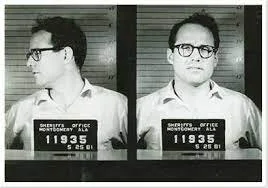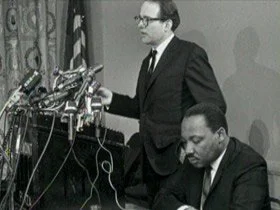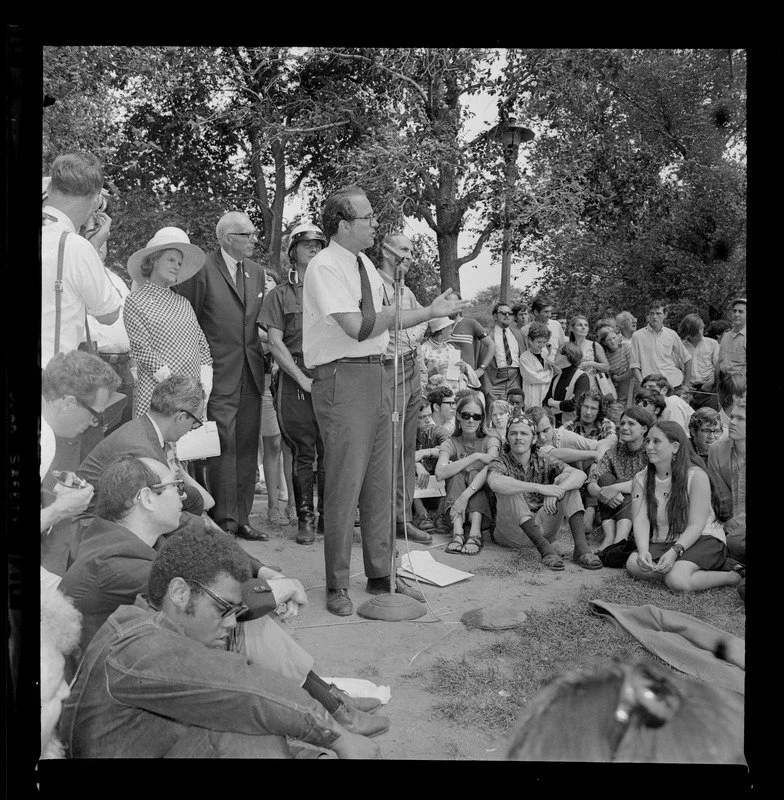The Life and Legacy of William Sloane Coffin, Jr.
Rev. Coffin’s funeral Eulogy for Alex is found HERE.
The Life and Legacy of William Sloane Coffin, Jr.
Prophetic Pulpit and Public Protest
William Sloane Coffin Jr. (1924–2006) was an American clergyman who embodied the idea of faith lived out through public witness. From the halls of privilege to the pulpits of protest, his life intersected the defining social and political movements of the 20th century. This article explores Coffin’s evolution from a young man of influence to one of the most prophetic voices of the American church, speaking truth to power from the pulpit of Riverside Church in New York City and beyond.
Early Life and Influences
Born into a prominent family, William Sloane Coffin Jr. grew up among both titans of industry and theological leaders. His great-grandfather, William Sloane, co-founded the W. & J. Sloane furniture company, while his uncle, Henry Sloane Coffin, served as president of Union Theological Seminary and was a major voice in American Protestantism. These early exposures to faith and social responsibility left a deep impression on him.
Despite these roots, Coffin initially followed a path typical of his social class. He attended prestigious prep schools, enrolled at Yale University, and joined the secret society Skull and Bones, alongside future president George H. W. Bush. After serving in World War II, he joined the CIA during the Cold War—a period that exposed him to the dissonance between national security interests and moral convictions.
A Crisis of Conscience
Coffin’s growing unease with war, politics, and privilege led him to enroll at Union Theological Seminary in 1949. Two figures and ideas left a lasting mark:
Reinhold Niebuhr's Theology: Niebuhr emphasized Christian realism, prophetic critique, and the call to engage with the social sins of the age. His theology gave Coffin a language for his own moral restlessness.
Cultural Awakening: The post-war context, with its civil rights struggles and nuclear anxieties, gave urgency to Coffin’s call to ministry.
In 1956, he was ordained as a Presbyterian minister. From that moment on, his preaching and activism were inseparable.
Preacher, Prophet, and Protestor
After serving as chaplain at Phillips Academy and Williams College, Coffin returned to Yale in 1958 as university chaplain, a post he would hold until 1975. At Yale, he became nationally known for his outspoken opposition to segregation and the Vietnam War. He was arrested for his participation in civil rights demonstrations and publicly supported draft resistance. His sermons blended theology, philosophy, and current events, challenging students and the nation to embrace a more just society.
In 1977, Coffin became senior minister at Riverside Church in New York City. Known for its progressive theology and social engagement, Riverside was the perfect platform for Coffin’s preaching ministry. He called for justice not only in the U.S. but around the world, urging Christians to align their faith with action.
In 1983, Coffin faced a deeply personal tragedy when his son Alex died in a car accident. His funeral sermon, often titled A Eulogy for Alex, is one of the most honest and profound Christian reflections on grief, offering both pastoral comfort and theological clarity.
Leader for Peace and Justice
Coffin’s activism extended into the realm of nuclear disarmament. In 1987, he left Riverside to lead SANE/FREEZE, a national coalition advocating for peace and the elimination of nuclear weapons. Under his leadership, the organization helped organize major protests, including a demonstration against the Gulf War that drew over half a million people.
Rev. Coffin with Rev. Martin Luther King, Jr.
His activism took many forms:
Preaching: Coffin’s sermons were theologically rich and socially urgent, calling believers to engage with the injustices of the world.
Public Demonstrations: He stood with marchers and activists, often risking arrest to bring attention to critical issues.
Political Advocacy: Coffin met with members of Congress and global leaders, using diplomacy as another avenue for peace.
Ecumenical and Interfaith Work: He worked through the National Council of Churches and interfaith dialogues to unite people of diverse beliefs in common causes.
His famous quote, "Let us not confuse dissent with disloyalty. When the loyal opposition dies, I think the soul of America dies with it," encapsulates his understanding of patriotism and prophetic responsibility.
Legacy and Final Years
In his later years, Coffin suffered strokes that left him with limited mobility and speech. Despite this, he continued to write, teach, and mentor. He retired from SANE/FREEZE but remained a respected voice on matters of faith and public life.
Rev. Coffin met the moment and addressed the social sins of his day.
William Sloane Coffin Jr. died in 2006 at age 82. His sermons, writings, and activism continue to inspire new generations of preachers, pastors, and activists. The archives of his work, housed at Yale University, remain a treasure trove for anyone interested in prophetic Christianity.
Coffin's life reminds us that faith is not merely a private belief but a public force for good. His legacy challenges us to live with courage, to speak truth to power, and to walk alongside those who suffer.
Suggested Reading:
William Sloane Coffin Jr.: A Holy Impatience by Warren Goldstein
The Collected Sermons of William Sloane Coffin: Volumes One and Two
Explore More:
Additional Resources and Sermons by William Sloane Coffin Jr.:
The Collected Sermons of William Sloane Coffin: Volumes One and Two
PDF from The Thoughtful Christian / PRC Webinar:
https://www.prcli.org/wp-content/uploads/2020/05/The-Thoughtful-Christian-PRC-Webinar.pdf
“The Rev. William Sloane Coffin – Baptism”
Sermon from the Cathedral of the Holy Spirit:
https://cathedral.org/sermons/the-rev-william-sloane-coffin-baptism/
William Sloane Coffin Sermon Archive
Downloadable sermons hosted by the William Sloane Coffin Project:
https://williamsloanecoffin.org/download-sermons/
“William Sloane Coffin – Riverside Church Sermon”
Sermon video on YouTube:
https://m.youtube.com/watch?v=w1W5e2uvsqQ
“William Sloane Coffin – Anti-War Speech”
Speech video on YouTube:
https://m.youtube.com/watch?v=gl-bjtDYiMk
“A Sermon by William Sloane Coffin”
Sermon archived in the Duke University Chapel Repository:
https://chapel.duke.edu/archives/preaching?year%5Bvalue%5D%5Byear%5D=


